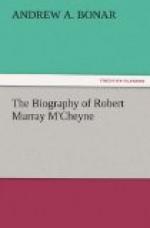Before this period he had received a bias towards the ministry from his brother David, who used to speak of the ministry as the most blessed work on earth, and often expressed the greatest delight in the hope that his younger brother might one day become a minister of Christ. And now, with altered views,—with an eye that could gaze on heaven and hell, and a heart that felt the love of a reconciled God,—he sought to become a herald of salvation.
He had begun to keep a register of his studies, and the manner in which his time slipped away, some months before his brother’s death. For a considerable time this register contains almost nothing but the bare incidents of the diary, and on Sabbaths the texts of the sermons he had heard. There is one gleam of serious thought—but it is the only one—during that period. On occasion of Dr. Andrew Thomson’s funeral, he records the deep and universal grief that pervaded the town, and then subjoins: “Pleasing to see so much public feeling excited on the decease of so worthy a man. How much are the times changed within these eighteen centuries, since the time when Joseph besought the body in secret, and when he and Nicodemus were the only ones found to bear the body to the tomb!”
It is in the end of the year that evidences of a change appear. From that period and ever onward his dry register of every-day incidents is varied with such passages as the following:—
“Nov. 12.—Reading H. Martyn’s Memoirs. Would I could imitate him, giving up father, mother, country, house, health, life, all—for Christ. And yet, what hinders? Lord, purify me, and give me strength to dedicate myself, my all, to Thee!”
“Dec. 4.—Reading Legh Richmond’s Life. Poetentia profunda, non sine lacrymis. Nunquam me ipsum, tam vilem, tam inutilem, tam pauperim, et praecipue tam ingratum, adhuc vidi. Sint lacrymae dedicationis meae pignora!’” ["Deep penitence, not unmixed with tears. I never before saw myself so vile, so useless, so poor, and, above all, so ungrateful. May these tears be the pledges of my self-dedication!”] There is frequently at this period a sentence in Latin occurring like the above in the midst of other matter, apparently with the view of giving freer expression to his feelings regarding himself.
“Dec. 9.—Heard a street-preacher: foreign voice. Seems really in earnest. He quoted the striking passage, ’The Spirit and the bride say, Come, and let him that heareth say, Come!’ From this he seems to derive his authority. Let me learn from this man to be in earnest for the truth, and to despise the scoffing of the world.”




